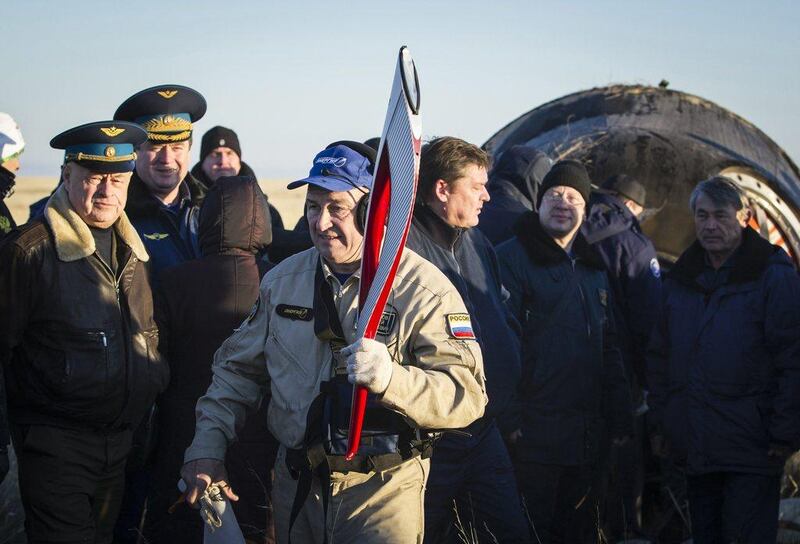MOSCOW // Three astronauts returned to Earth on Monday after a 166-day mission, bringing the Olympic torch back from the International Space Station after a historic space walk.
The trip completed the most ambitious leg of Russia’s unparallelled torch relay in the run-up to the Winter Olympic Games in Sochi in February.
The Soyuz capsule carrying Russian cosmonaut Fyodor Yurchikhin, US NASA astronaut Karen Nyberg and Italian colleague Luca Parmitano touched down on the frosty steppes of Kazakhstan at 2:49 GMT (6:49 UAE time).
The torch, kept unlit throughout its space journey due to safety precautions on the space station and lack of oxygen in open space, was securely wrapped during the descent, and an employee of Russia’s space agency Roscosmos took it out of the packaging.
“Here’s the torch!” he said, presenting it to the cameras before handing it to veteran space traveller and Soyuz captain Yurchikhin, who sat smiling wrapped up in a blue blanket near the Soyuz.
Yurchikhin took off his gloves and posed for pictures with the 1.8-kilogramme and nearly metre-long torch.
After a few minutes, Nyberg and Parmitano, who had completed his first space voyage, were also extricated from the craft, which had landed on its side - something that frequently happens due to the drag of the parachute.
The trio sat briefly in the sunshine surrounded by support staff as well as the flags of Russia and the Sochi Olympic Games before being carried to a heated medical tent to change out of their launch suits and undergo initial medical tests.
The capsule completed a “flawless descent” and touched down exactly on time in a “bulls-eye landing,” a NASA TV commentator said.
“The crew is feeling well,” Roscosmos said in a statement.
Dominated by the Olympic theme, the returning 37th expedition nevertheless carried out the usual scientific research and was not without drama - at one point Parmitano’s helmet started accumulating water on a space walk, cutting off all visibility and forcing him to return inside quickly.
A team of three Russians, two Americans, and a Japanese astronaut remain aboard the ISS which, before Monday’s return had been crammed with nine people, who hosted a rare conference from space last week.
Russia sent the torch on its four-day space mission on Thursday and even covered the rocket in Olympic insignia. The torch was “hung” in the Russian module after taking a tour of the space station.
Cosmonauts Oleg Kotov and Sergey Ryazansky on Saturday took it for a space walk and photo op, posing spectacularly against the backdrop of the ISS and the Earth and completing a torch handover that was viewed live worldwide and shown on screens in New York’s Times Square.
The space-travelling torch will light the Olympic cauldron in the Black Sea resort of Sochi, marking the start of the Winter Games on February 7, authorities said.
The futuristic-looking torch has another connection to space - it was produced at the KrasMash factory in Siberia that makes the heavy Proton rockets Russia uses to haul satellites to orbit.
Russia has put together an impressive Olympic relay, sending the torch through all of its regions and as far as the North Pole on a nuclear-powered icebreaker.
The relay, a no-expense-spared event that has seen many government officials, celebrities and Olympic champions participate, will also take the torch to the world’s deepest freshwater lake Baikal and Europe’s highest mountain peak Elbrus.
Following Sochi’s winning bid, promoted by President Vladimir Putin, Russia will host its first Olympic event since the 1980 Summer Games in Moscow, which were boycotted by a number of Western nations over the Soviet invasion of Afghanistan.
Although a space walk with a torch was unprecedented, other Olympic torches have travelled to space on US space shuttle voyages ahead of the 1996 Summer Games in Atlanta and the 2000 Games in Sydney.
* Agence France-Presse





